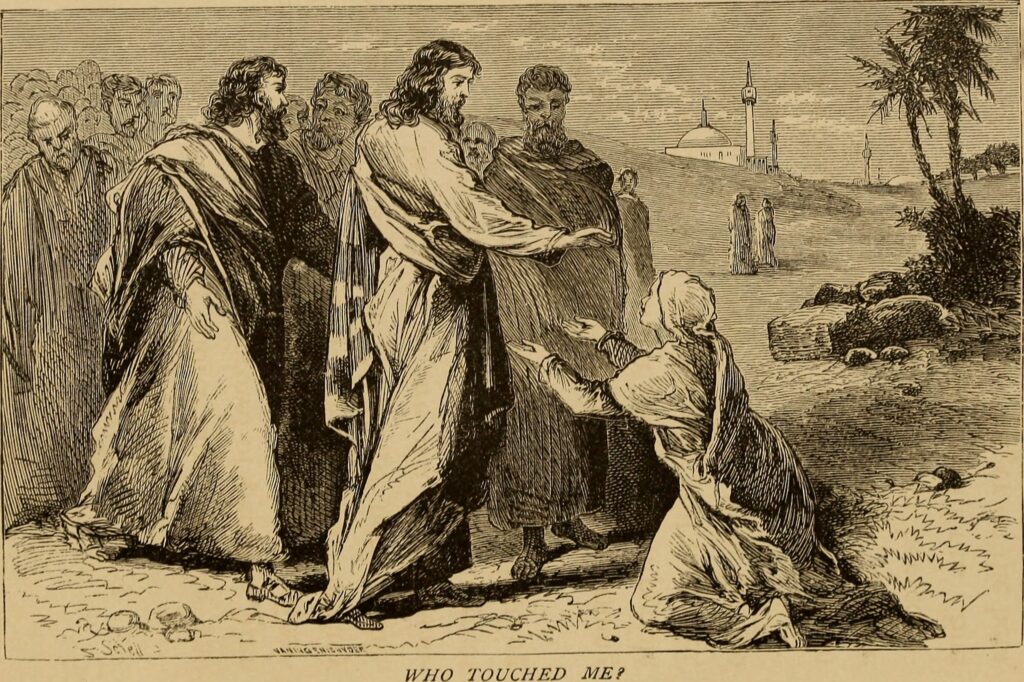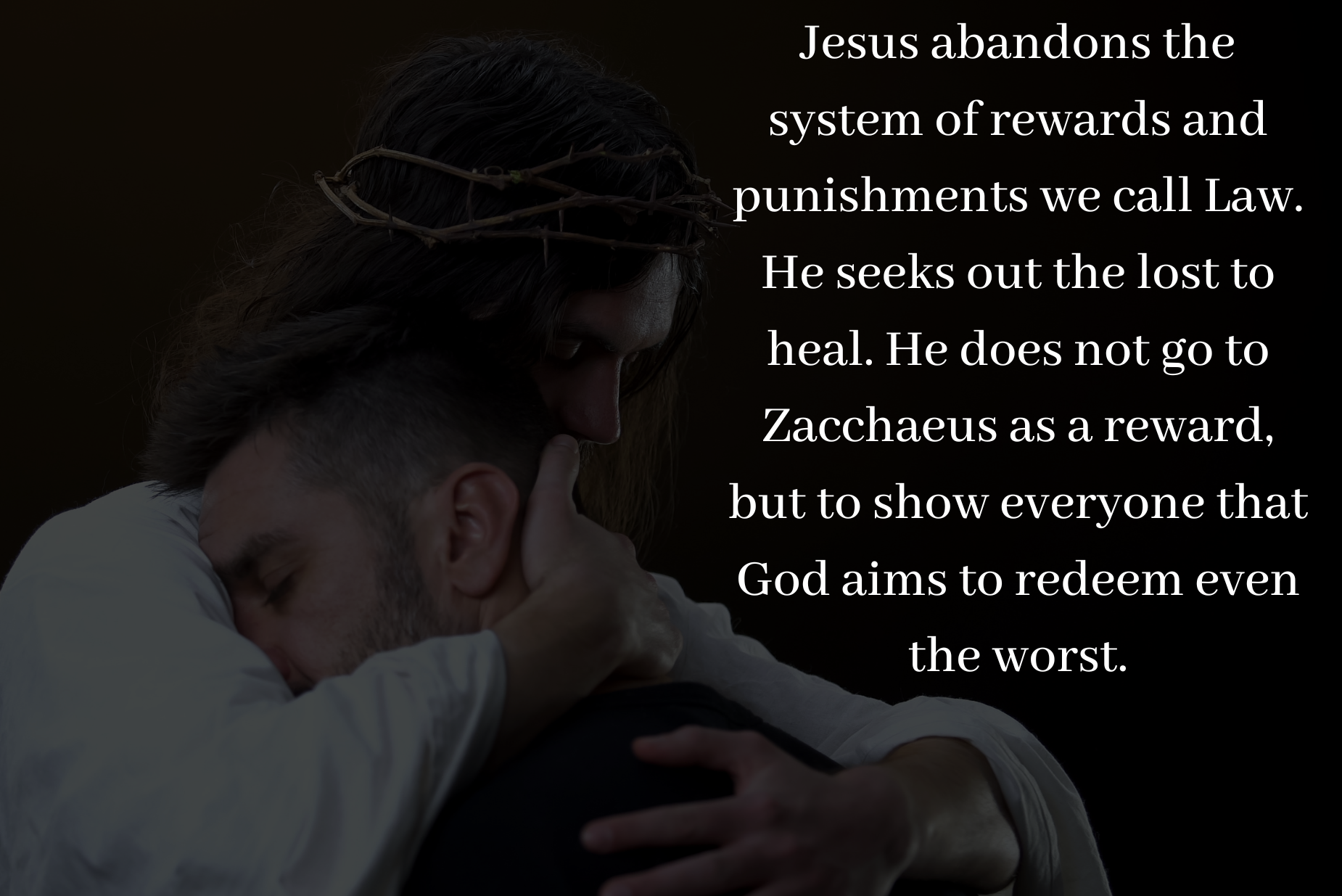Second Sunday after Pentecost
We Use Requirements, Jesus Uses Mercy
Matthew 9:9-13, 18-26
Second Sunday after Pentecost
Analysis by Timothy Hoyer
9As Jesus was walking along, he saw a man called Matthew sitting at the tax booth; and he said to him, “Follow me.” And he got up and followed him. 10And as he sat at dinner in the house, many tax collectors and sinners came and were sitting with him and his disciples. 11When the Pharisees saw this, they said to his disciples, “Why does your teacher eat with tax collectors and sinners?” 12But when he heard this, he said, “Those who are well have no need of a physician, but those who are sick. 13Go and learn what this means, ‘I desire mercy, not sacrifice.’ For I have come to call not the righteous but sinners.”
18While he was saying these things to them, suddenly a leader of the synagogue came in and knelt before him, saying, “My daughter has just died; but come and lay your hand on her, and she will live.” 19And Jesus got up and followed him, with his disciples. 20Then suddenly a woman who had been suffering from hemorrhages for twelve years came up behind him and touched the fringe of his cloak, 21for she said to herself, “If I only touch his cloak, I will be made well.” 22Jesus turned, and seeing her he said, “Take heart, daughter; your faith has made you well.” And instantly the woman was made well. 23When Jesus came to the leader’s house and saw the flute players and the crowd making a commotion, 24he said, “Go away; for the girl is not dead but sleeping.” And they laughed at him. 25But when the crowd had been put outside, he went in and took her by the hand, and the girl got up. 26And the report of this spread throughout that district.

Around the tea-table – Talmage, T. De Witt – from https://commons.wikimedia.org/
Jesus is Jesus, not a list of requirements. He is God’s mercy in human form, he is God’s welcome with no entry fee, he is the doctor from God who cares for the sick, not those who are well.
DIAGNOSIS: We Use Requirements
Step 1: Initial Diagnosis (External Problem): There Are Requirements
Grounding: You are supposed to be good. And there are requirements used to determine if you are good. Thus, the Pharisees had the requirement that you could not be good if you are a tax collector. And there were a whole lot of other requirements they used to accuse lots of others as unwanted by God—in other words, sinners.
Tracking: We are supposed to be good. It’s demanded of us no matter how we spend our days. Whatever we do has its list of what is required of us to achieve that goodness—earn money, look well-dressed or look tough, have the right skin color, live in the right part of the city, show up on time, be self-sufficient, contribute to making others rich, belong to the correct political party, or have kids that excel at sports. The list goes on and on and on and on and on.
Step 2: Advanced Diagnosis (Internal Problem): We Like Requirements
Grounding: That list of requirements is not just a list. It is a god in that it becomes the thing that we fear, love, and trust for our worth. That list is to be trusted, followed, adhered to. It is all that matters. So if your daughter dies, you have failed. If you are hemorrhaging, you have failed.
Tracking: That list of requirements is what makes us say, “We’re just following the rules.” It does not matter if the rules prevent help from being given or if following the rules hurts someone. “Sorry, we’re just following the rules.” The rules are obeyed, trusted, as if the rules are god. So if we can’t get help, if no one has time to help us, then we don’t matter. We have failed to meet the requirements. And everyone thinks that’s just fine. Everyone trusts the false promises that accompany the list of requirements.
Step 3: Final Diagnosis (Eternal Problem): Requirements Fail, We Fail
Grounding: The Pharisees said that the requirements are God’s requirements. God made the list. God is making the demands. God judges. Death is God’s final verdict. Oddly, that verdict is for everyone, even those who seem to meet the requirements on the list. Maybe there is a requirement we have not noticed or have ignored, like “Love God most of all.”
Tracking: No matter how hard we try, daughters die, sons die, soldiers die, people die from drug overdoses, students and teachers are shot and killed, shoppers in malls are shot and killed. That list of requirements, even if mostly kept, does not keep us safe. It makes no sense. If God has not protected us, has God failed to meet our requirements or have we failed to meet God’s requirements? Either way, it’s a mess.
PROGNOSIS: Jesus Gives Us the Power of His Mercy
Step 4: Initial Prognosis (Eternal Solution): Jesus’ Failure on a Cross Is Our “It’s for Us!”
Grounding: Jesus is Jesus, not a list of requirements. He is God’s mercy in human form, he is God’s welcome with no entry fee, he is the doctor from God who cares for the sick, not those who are well. The Pharisees condemn him for failing to fulfill the list of requirements, the very list they use to put him on a cross. Yet God raised Jesus from the dead, revealing how God desires mercy, how God is for the sick, how God eats with tax collectors and sinners. The list of requirements to prove one’s goodness is gone.
Crossing: As Jesus is risen, he promises to raise us to life with God. We die with him and now we live in him. Our new life in Jesus never ends. Who we are in Jesus never dies because we are in the risen Jesus who will never die again. We are safe in him.
Step 5: Advanced Prognosis (Internal Solution): Faith in Jesus Is Given—No Requirements
Grounding: The woman who touched the fringe of Jesus’ cloak was healed by Jesus because, as he said, “Take heart, daughter, your faith (in me) has made you well.” And the faith of the father whose daughter had just died is also the reason Jesus said that she was not dead but sleeping; so he took her by the hand and she got up.
Crossing: Jesus’ rising from the dead is his promise to give us life with God. He does this by forgiving our sin sickness. We, like the woman and the father, are made well before God by our faith in Jesus. Jesus eats with us, welcomes us, and is the physician who heals us from all the false promises we have trusted.
Step 6: Final Prognosis (External Solution): We Have Mercy to Live By
Grounding: The new life Jesus gives us is about mercy, not sacrifice. That new life is about calling sinners, not the righteous, into God’s good company. Jesus, the skilled master of calling sinners, shows us how he does it. He eats with tax collectors and sinners, heals a woman, and he restores life to a daughter.
Crossing: Having received mercy, we learn what it means to give mercy without having to offer our deeds as our sacrifices to God (as if paying God with our sacrifices earns us a good standing before God). We learn to give life to the outcast and sick without requiring payment of any kind—not money, not social status, and not obedience to rules. We learn how to forgive when we have been hurt. We learn how to promise Jesus’ life to someone who is dying. We learn how to sit at table with those we disagree with. We learn that—since we are in Jesus—our place in life is safe and does not have to be gained by winning arguments, or being right, or declaring our country or neighborhood fit for only certain kinds of people. Mercy is now our guide for how we live with others.


